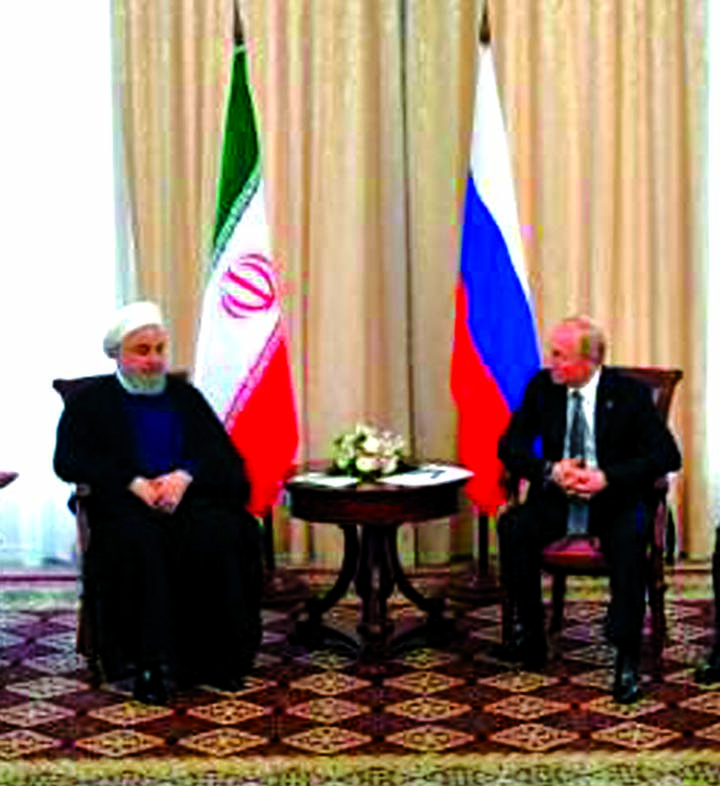
Reuters, Dushanbe :
Iran will continue scaling back compliance with its nuclear deal commitments unless other signatories show “positive signals”, the Iranian president told a meeting of Russian, Chinese and other Asian leaders in Tajikistan.
Iran stopped complying in May with some commitments in a 2015 nuclear deal that was agreed with global powers, a year after the United States unilaterally withdrew from the accord and tightened sanctions.
Tehran said in May that Iran would start enriching uranium at a higher level, unless world powers protected its economy from U.S. sanctions within 60 days.
“Obviously, Iran cannot stick to this agreement unilaterally,” President Hassan Rouhani told the Conference on Interaction and Confidence Building Measures in Asia.
“It is necessary that all the sides of this agreement contribute to restoring it,” he said, adding that Iran needed to see “positive signals” from other signatories to the pact, which include Russia, China, Britain, France and Germany.
He did not give details on what actions Iran would take or say what positive signals Tehran wanted to see.
France and other European signatories to the deal, which aimed to curb Iran’s nuclear ambitions, have said they wanted to save it, but many of their companies have canceled deals with Tehran, under financial pressure from the United States.
Western powers have accused Iran of seeking to develop nuclear weapons, a charge Tehran denies saying it wants nuclear technology for peaceful purposes.
Rouhani made no mention of attacks on two tankers in the Gulf of Oman this week which Washington has blamed on Tehran, raising concern about new confrontation. Iran has denied any role in the attacks.
Earlier, European countries said on Thursday they wanted to preserve Iran’s nuclear deal and rejected “ultimatums” from Tehran, after Iran relaxed restrictions on its nuclear program and threatened moves that might breach the 2015 international pact.
Iran’s announcement on Wednesday, related to curbs on its stockpiling of nuclear materials, was in response to U.S. sanctions imposed following President Donald Trump’s withdrawal of the United States from the accord with Tehran a year ago.
Iran’s initial moves do not appear to violate the accord yet. But President Hassan Rouhani said that unless the world powers which signed the deal protect Iran’s economy from U.S. sanctions within 60 days, Iran would start enriching uranium beyond limits set in the agreement.
“We reject any ultimatums and we will assess Iran’s compliance on the basis of Iran’s performance regarding its nuclear-related commitments …,” read a statement issued jointly by the European Union and the foreign ministers of Britain, France and Germany, co-signatories of the deal.
“We are determined to continue pursuing efforts to enable the continuation of legitimate trade with Iran,” they said, adding that this included getting a special purpose vehicle aimed at enabling non-dollar business with Iran off the ground.
In response, Iranian Foreign Minister Mohammad Javad Zarif said in a Twitter post that EU countries should uphold their obligations in the nuclear deal with Iran and normalize economic ties despite U.S. sanctions, “instead of demanding that Iran unilaterally abide by a multilateral accord”.
The nuclear deal required Iran to curb its uranium enrichment capacity to head off any pathway to developing a nuclear bomb, in return for the removal of most international sanctions. A series of more intrusive U.N. inspections under the deal have verified that Iran is meeting its commitments.
Iran has always denied that it was seeking a nuclear weapon and says it wants to abide by the nuclear deal.
The Trump administration argues that the nuclear deal was flawed because it is not permanent, does not address Iran’s missile program and does not punish Iran for what Washington considers meddling in regional countries.
U.S. Secretary of State Mike Pompeo alluded to that in a statement on Thursday.
“To date the regime’s default option has been violence, and we appeal to those in Tehran who see a path to a prosperous future through de-escalation to modify the regime’s behavior,” Pompeo said.
“Our restraint to this point should not be mistaken by Iran for a lack of resolve,” Pompeo said.

